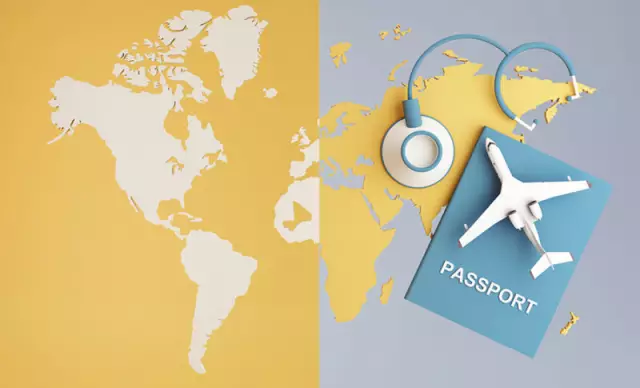- Author Rachel Wainwright wainwright@abchealthonline.com.
- Public 2023-12-15 07:39.
- Last modified 2025-11-02 20:14.
How to stay healthy while traveling abroad?
Summer is in full swing. Many are going to take a vacation abroad. The gentle seas, sightseeing, visits to natural and cultural reserves await travelers. Unfortunately, this is not all. On a trip abroad, you can face diseases that not only ruin the long-awaited vacation, but also force you to be treated for many months after it. It is impossible to completely insure against troubles of this kind, but everyone is capable of minimizing their probability.

Source: depositphotos.com
Health hazards for vacationers
According to experts, the first place in the list of ailments that await us on foreign trips is occupied by all kinds of poisoning. The temptation to try exotic dishes is great, and not all vacationers observe reasonable moderation. Some of the owners of food outlets (especially in popular budget resorts), in turn, are not very conscientious about the observance of sanitary and hygienic standards. The result is numerous episodes of lesions of the gastrointestinal tract - from banal food poisoning to dysentery and other serious illnesses. Vacationers often buy drinks, fruits and berries on the beaches. In the heat, all these delicacies quickly deteriorate, causing poisoning. It is not uncommon for children to get gastrointestinal infections by swallowing water while bathing. Adults face a similar danger:cocktail ice is usually made from tap water, which may be of poor quality.
Every summer, many beach-goers go to their doctors with complaints of sunburn and heatstroke. Everyone dreams of getting a luxurious southern tan, but attempts to get one in two or three days end badly. For inexperienced skiers, injuries sustained on the slopes while vacationing in mountain resorts are common.
Contacts with representatives of exotic fauna are extremely dangerous for the health of tourists. This is not about getting to know a boa constrictor or a crocodile: the bite of an insect or an inhabitant of a coral reef in case of an allergic reaction can lead to very sad consequences. No less unpleasant are diseases caused by some parasites common in countries with tropical climates and living in fresh water bodies or in the sand of beaches. The diagnosis and treatment of the ailments that they cause can be very complex and lengthy.
For travelers prone to allergies, exotic amphibians, reptiles and even plants, especially those that bloom magnificently and beautifully, are dangerous. A painful reaction can be provoked by unfamiliar foods and drinks, fruits, spices, vegetable dyes that are used to make fabrics. This must be borne in mind when buying souvenirs and visiting local bazaars.
Tourists vacationing in one of the countries of Southeast Asia, Africa or South America are at risk of contracting malaria, yellow fever and cholera. The likelihood of contracting salmonellosis in these regions is also very high compared to more civilized holiday destinations.
Preparing for the trip and rules of conduct on vacation
In most cases, the traveler who is in trouble abroad is to blame. The reasons are quite obvious: on vacation you want to relax, forget about problems and just enjoy new impressions. However, such carelessness is impermissible. To stay safe and enjoy your vacation without any problems, you need to take the following steps:
- learn in advance about diseases common in the region you intend to visit. In addition to the information provided by the travel agency employees, it is worth using other sources (travel guides, impressions of other travelers posted on the Internet, etc.);
- consult with your doctor about preventive vaccination. Many serious illnesses can be prevented with vaccinations. This should be done long before the vacation, since not every vaccine works immediately (some of them are introduced two to three months before traveling to a foreign country). By the way, sometimes states prohibit unvaccinated tourists from entering their territory, which is also useful to find out in advance. Vaccination against exotic infections is done for a fee, but if there is an opportunity, it should be done - treatment in case of infection will cost much more;
- collect a travel first aid kit. It should include medicines for chronic diseases, diarrhea and other gastrointestinal problems (enzymes, activated charcoal, etc.), mild antipyretic, pain relievers (analgesics and antispasmodics), antihistamines. It makes sense to take pills or lozenges for coughs and antiherpetic ointment with you (many with a change in climate show symptoms of herpes). In addition, the tourist's luggage must contain dressings (bandage, plaster), an antiseptic spray, drops that relieve eye fatigue, a drug for insect bites, a cream for swelling and pain in the legs, as well as a remedy for sunburn. But when choosing the necessary drugs, you need to ask whether they are all allowed to be imported into the country of your future stay.

Source: depositphotos.com
On vacation you should not:
- get carried away with exotic food and drinks;
- eat in unverified places and buy food from random vendors;
- drink raw water;
- swim in freshwater bodies;
- walking barefoot on the beach;
- sunbathe during the hottest hours of the day and sleep in the open sun;
- touch exotic animals and insects;
- touch and smell local flowers;
- engage in extreme sports (mountain skiing, surfing, diving) without the help of an experienced instructor.
Separately, it should be said about the life and health insurance of persons traveling abroad. Travel companies that sell foreign vouchers include the costs of providing a minimum package of medical services. Most travelers consider even such insurance to be unnecessary, and in vain. In the most popular Egyptian, Turkish, Indian and Asian resorts, illnesses and accidents among vacationers are very common, and insurance guarantees the assistance of local doctors. With a responsible attitude to one's own health, it makes sense not only to buy the minimum insurance, but also to expand the list of options included in it, based on the specifics of the future vacation (beach, tourist, ski, etc.).
To enter the countries of the Schengen zone, the policy must be issued simultaneously with the visa, otherwise the tourist may be detained at the border. For a traveler going to the United States, medical insurance is not required, but he must be ready to spend a very substantial amount on treatment in case of illness. All these nuances should be clarified long before the trip so as not to face unpleasant surprises at the very last moment.
Going abroad, a person should understand that only responsibility and caution will help avoid trouble. Therefore, you should not completely relax on vacation. Competent preparation and reasonable behavior to a large extent guarantee the traveler no health problems and only positive impressions of the trip.
YouTube video related to the article:

Maria Kulkes Medical journalist About the author
Education: First Moscow State Medical University named after I. M. Sechenov, specialty "General Medicine".
Found a mistake in the text? Select it and press Ctrl + Enter.






